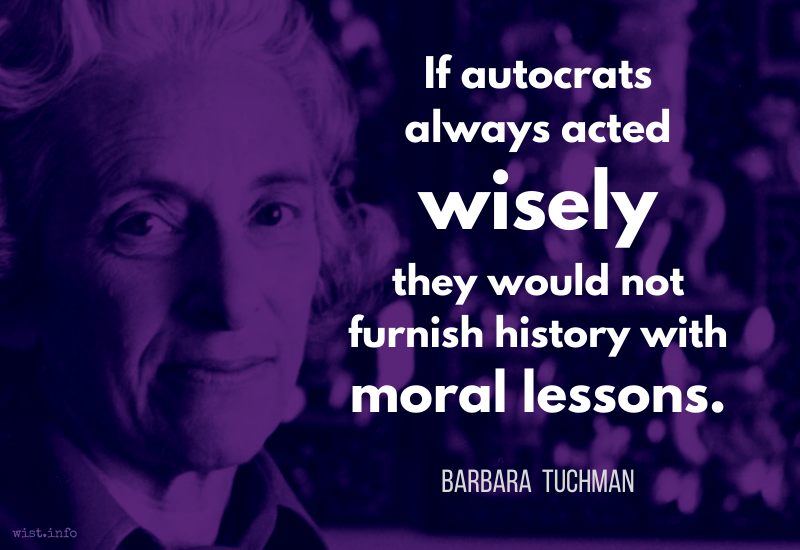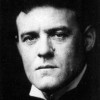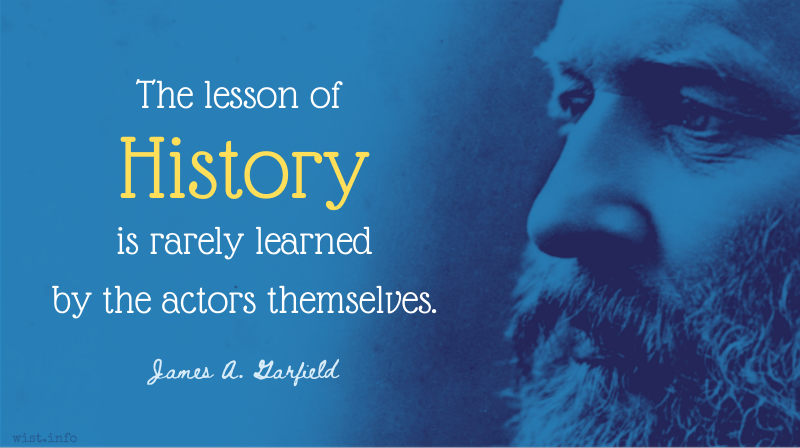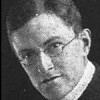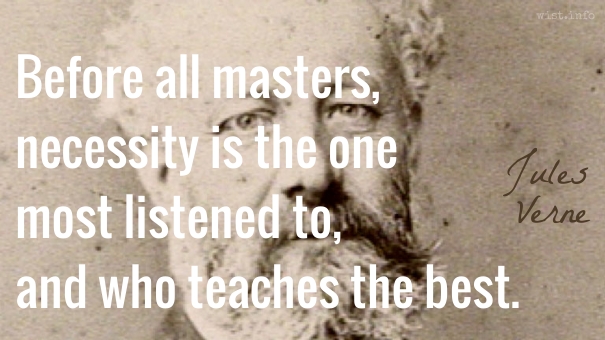Quotations about:
lesson
Note not all quotations have been tagged, so Search may find additional quotes on this topic.
Misbehavior and punishment are not opposites that cancel each other; on the contrary, they breed and reinforce each other. Punishment does not deter misconduct. It makes the offender more skillful in escaping detection. When children are punished they resolve to be more careful, not more obedient or responsible.
Haim Ginott (1922-1973) Israeli-American school teacher, child psychologist, psychotherapist [b. Haim Ginzburg]
Between Parent and Child: Revised and Updated Edition, ch. 5 “Discipline” (2003 ed.) [with A. Ginott and H. W. Goddard]
(Source)
Children learn what they experience. They are like wet cement. Any word that falls on them makes an impact.
Haim Ginott (1922-1973) Israeli-American school teacher, child psychologist, psychotherapist [b. Haim Ginzburg]
Between Parent and Child: Revised and Updated Edition, ch. 10 “Summing Up” (2003 ed.) [with A. Ginott and H. W. Goddard]
(Source)
Frequently paraphrased (e.g.) as "Children are like wet cement. Whatever falls on them makes an impression."
This is usually cited as being from the original 1965 edition of the book, but cannot be found there. Instead, it appears to be from the 2003 edition, as revised and updated by his wife, Dr Alice Ginott, and Dr H Wallace Goddard. It is unclear if Haim Ginott may have used this phrase in other contexts.
History. We want to find moral lessons in it, but its only lessons are of politics, military art, etc.
Joseph Joubert (1754-1824) French moralist, philosopher, essayist, poet
Pensées [Thoughts], 1806 [tr. Auster (1983)]
(Source)
I have been unable to find an analog in other translations, or in the original French.
Most people learn nothing from experience, except confirmation of their prejudices.
Bertrand Russell (1872-1970) English mathematician and philosopher
“The Lessons of Experience,” New York American (1931-09-23)
(Source)
This was unwise, but if autocrats always acted wisely they would not furnish history with moral lessons.
Barbara W. Tuchman (1912-1989) American historian and author
A Distant Mirror, ch. 21 “The Fiction Cracks” (1978)
(Source)
On young King Richard II's giving substantial offices and lands to his friend and mentor, the Earl of Oxford, in so doing making an enemy of the Duke of Gloucester.
Men will learn eventually, and if they insist on rejecting the received wisdom of generations past, they do not thereby succeed at invalidating it; they merely condemn themselves to learning it, time and again, by ever grimmer experience.
Hilaire Belloc (1870-1953) Franco-British writer, historian [Joseph Hilaire Pierre René Belloc]
(Misattributed)
(Source)
While usually attributed to Belloc, and even further to his essay "The Restoration of Property" (1936), it does not appear in that work, proper. Rather, it is found in the Introduction to the 2002 IHS Press edition the work, signed only by the Directors of the IHS Press.
Yet if states were destroyed, local institutions corrupted, and economic incentives directed towards murder, few of us would behave well. There is little reason to think that we are ethically superior to the Europeans of the 1930s and 1940s, or for that matter less vulnerable to the kind of ideas that Hitler so successfully promulgated and realized.
Timothy Snyder (b. 1969) American historian, author
Black Earth: The Holocaust as History and Warning, “Conclusion” (2015)
(Source)
He [Napoleon III] was what I often think is a dangerous thing for a statesman to be — a student of history, and like most of those who study history, he learned from the mistakes of the past how to make new ones.
A. J. P. Taylor (1906-1990) British historian, journalist, broadcaster [Alan John Percivale Taylor]
“Mistaken Lessons from the Past,” The Listener (6 Jun 1963)
(Source)
Wisdom is by far the greatest part of joy,
and reverence toward the gods must be safeguarded.
The mighty words of the proud are paid in full
with mighty blows of fate, and at long last
those blows will teach us wisdom.[πολλῷ τὸ φρονεῖν εὐδαιμονίας
πρῶτον ὑπάρχει. χρὴ δὲ τά γ᾽ εἰς θεοὺς
μηδὲν ἀσεπτεῖν. μεγάλοι δὲ λόγοι
μεγάλας πληγὰς τῶν ὑπεραύχων
ἀποτίσαντες
γήρᾳ τὸ φρονεῖν ἐδίδαξαν.]Sophocles (496-406 BC) Greek tragic playwright
Antigone, l. 1348ff [Chorus] (441 BC) [tr. Fagles (1982), l. 1466ff]
(Source)
Final lines of the play. Original Greek. Alternate translations:
Wisdom is first of the gifts of good fortune:
'Tis a duty, to be sure, the rites of the Gods
Duly to honor: but words without measure, the
Fruit of vain-glory, in woes without number their
Recompense finding,
Have lesson'd the agéd in wisdom.
[tr. Donaldson (1848)]
Of happiness the chiefest part
Is a wise heart:
And to defraud the gods in aught
With peril's fraught.
Swelling words of high-flown might
Mightily the gods do smite.
Chastisement for errors past
Wisdom brings to age at last.
[tr. Storr (1859)]
Wise conduct hath command of happiness
Before all else, and piety to Heaven
Must be preserved. High boastings of the proud
Bring sorrow to the height to punish pride: --
A lesson men shall learn when they are old.
[tr. Campbell (1873)]
Wisdom is provided as the chief part of happiness, and our dealings with the gods must be in no way unholy. The great words of arrogant men have to make repayment with great blows, and in old age teach wisdom.
[tr. Jebb (1891)]
Wisdom alone is man's true happiness.
We are not to dispute the will of heaven;
For ever are the boastings of the proud
By the just gods repaid, and man at last
Is taught to fear their anger and be wise.
[tr. Werner (1892)]
Wisdom is the supreme part of happiness; and reverence towards the gods must be inviolate. Great words of prideful men are ever punished with great blows, and, in old age, teach the chastened to be wise.
[tr. Jebb (1917)]
There is no happiness where there is no wisdom;
No wisdom but in submission to the gods.
Big words are always punished
And proud men in old age learn to be wise.
[tr. Fitts/Fitzgerald (1939), l. 1039ff]
Of happiness the crown
And chiefest part
Is wisdom, and to hold
The gods in awe.
This is the law
That, seeing the stricken heart
Of pride brought down,
We learn when we are old.
[tr. Watling (1947), Exodos, l. 1027ff]
Our happiness depends
on wisdom all the way.
The gods must have their due.
Great words by men of pride
bring greater blows upon them.
So wisdom comes to the old.
[tr. Wyckoff (1954)]
Of happiness, far the greatest part is wisdom,
and reverence towards the gods.
Proud words of arrogant man, in the end,
Meet punishment, great as his pride was great,
Till at last he is schooled in wisdom.
[tr. Kitto (1962)]
Wisdom is supreme for a blessed life,
And reference for the gods
Must never cease. Great words, sprung from arrogance.
Are punished by great blows.
So it is one learns, in old age, to be wise.
[tr. Woodruff (2001)]
By far is having sense the first part
of happiness. One must not act impiously toward
what pertains to gods. Big words
of boasting men,
paid for by big blows,
teach having sense in old age.
[tr. Tyrell/Bennett (2002)]
The most important thing in man’s happiness is good judgement and he must not treat with disdain the works of the gods.
The arrogant pay for their big proud words with great downfalls and it’s only then, in their old age that they gain wisdom!
[tr. Theodoridis (2004)]
The most important part of true success
is wisdom -- not to act impiously
towards the gods, for boasts of arrogant men
bring on great blows of punishment --
so in old age men can discover wisdom.
[tr. Johnston (2005)]
Knowledge truly is by far the most important part of happiness, but one must neglect nothing that the gods demand. Great words of the over-proud balanced by great falls taught us knowledge in our old age.
[tr. Thomas (2005)]
The moral of “The Three Bears,” for instance, is “Never break into someone else’s house.” The moral of “Snow White” is “Never eat apples.” The moral of World War One is “Never assassinate Archduke Ferdinand.”
The lesson of History is rarely learned by the actors themselves.
James A. Garfield (1831-1881) US President (1881), lawyer, lay preacher, educator
Letter to Professor Demmon (16 Dec 1871)
(Source)
The essence of success is that it is never necessary to think of a new idea oneself. It is far better to wait until somebody else does it, and then to copy him in every detail, except his mistakes.
Aubrey Menen (1912-1989) British writer, novelist, satirist, theatre critic
The Abode of Love, Part 3, “The Random Wooings” (1956)
(Source)
Success don’t konsist in never making blunders, but in never making the same one the seckond time.
[Success doesn’t consist in never making blunders, but in never making the same one the second time.]
I suggest that the only books that influence us are those for which we are ready, and which have gone a little farther down our particular path than we have yet got ourselves.
Poets are like proverbs: you can always find one to contradict another.
[Les poëtes sont comme les proverbes : l’un est toujours là pour contredire l’autre.]
Jules Verne (1828-1905) French novelist, poet, playwright
The Survivors of the Chancellor, ch. 5 “An Unusual Route” (1875)
(Source)
But, on the other hand, Uncle Abner said that the person that had took a bull by the tail once had learnt sixty or seventy times as much as a person that hadn’t, and said a person that started in to carry a cat home by the tail was gitting knowledge that was always going to be useful to him, and warn’t ever going to grow dim or doubtful.
Mark Twain (1835-1910) American writer [pseud. of Samuel Clemens]
Tom Sawyer Abroad, ch. 10 (1894)
(Source)
Frequently misquoted as "A man who carries a cat by the tail learns something he can learn in no other way."
Before all masters, necessity is the one most listened to, and who teaches the best.
[La nécessité est, d’ailleurs, de tous les maîtres, celui qu’on écoute le plus et qui enseigne le mieux.]
Jules Verne (1828-1905) French novelist, poet, playwright
The Mysterious Island, Part 1, ch. 17 (1874)
(Source)
[I]t was followed by a long scream of rage mixed with a roar of complaint: “AAaargwannawannaaaagongongonaargggaaaaBLOON!” which is the traditional sound of a very small child learning that with balloons, as with life itself, it is important to know when not to let go of the string. The whole point of balloons is to teach small children this.
Terry Pratchett (1948-2015) English author
A Hat Full of Sky, ch. 11 “Arthur” (2004)
(Source)
This is apparently the origin of the much more frequently found paraphrase:
There are times in life when people must know when not to let go. Balloons are designed to teach small children this.
This shorter form has been used, among other places, in a Change.org petition to Death to reinstate Pratchett after the author's passing. It is possible Pratchett may have used it somewhere else, but I am unable to find it (it does not show up in the alt.fan.pratchett board in any message from him).
See also Cox.
One Month in the School of Affliction will teach thee more than the great Precepts of Aristotle in seven years; for thou canst never judge rightly of human Affairs, unless thou hast first felt the Blows, and found out the Deceits of Fortune.
Thomas Fuller (1654-1734) English physician, preacher, aphorist, writer
Introductio ad Prudentiam, #2749 (1731 ed.)
(Source)
If at first you don’t succeed, that’s one data point.
Randall Munroe (b. 1984) American webcomic writer, roboticist, programmer
XKCD, #1154 “Resolution” [rollover] (31 Dec 2012)
(Source)
Considering history as a moral exercise, her lessons would be too unfrequent if confined to real life. Of those recorded by historians few incidents have been attended with such circumstances as to excite in any high degree this sympathetic emotion of virtue. We are therefore wisely framed to be as warmly interested for a fictitious as for a real personage. The spacious field of imagination is thus laid open to our use, and lessons may be formed to illustrate and carry home to the mind every moral rule of life. Thus a lively and lasting sense of filial duty is more effectually impressed on the mind of a son or daughter by reading King Lear, than by all the dry volumes of ethics and divinity that ever were written.
Thomas Jefferson (1743-1826) American political philosopher, polymath, statesman, US President (1801-09)
Letter to Robert Skipwith (3 Aug 1771)
(Source)
Ask counsel of both times — of the ancienter time what is best, and of the latter time what is fittest.
Francis Bacon (1561-1626) English philosopher, scientist, author, statesman
“Of Great Place,” Essays, No. 11 (1625)
(Source)
We should be careful to get out of an experience only the wisdom that is in it — and stop there; lest we be like the cat that sits down on a hot stove-lid. She will never sit down on a hot stove-lid again — and that is well; but also she will never sit down on a cold one anymore.
It is some compensation for great evils that they enforce great lessons.
Christian Nestell Bovee (1820-1904) American epigrammatist, writer, publisher
Intuitions and Summaries of Thought, Vol. 1, “Compensation” (1862)
(Source)





